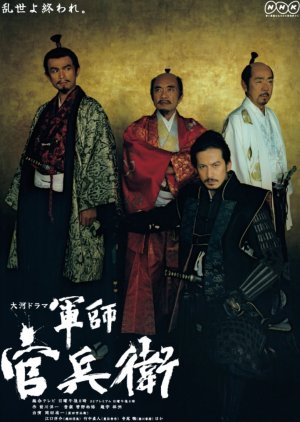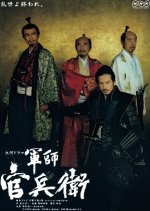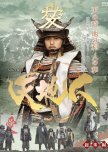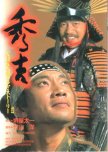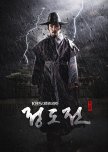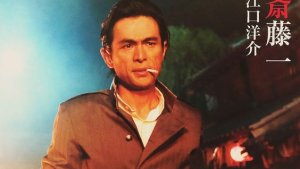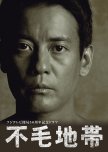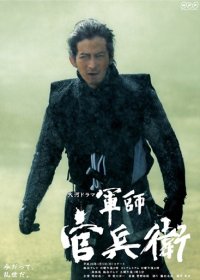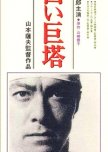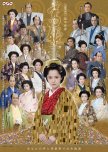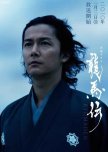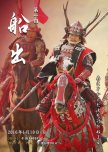 A Stalker's Guide to Matsuzaka Tori
A Stalker's Guide to Matsuzaka Tori Julio de 1590, Odawara. El ejército de Toyotomi Hideyoshi había rodeado el Castillo de Odawara más de tres meses, con la esperanza de conquistar este último obstáculo para su sueño de la unificación del país. De pie en la puerta del castillo, un hombre solo frente a los guardias amenazantes gritó: "No tire sus vidas lejos del tesoro viviente.!". No mucho tiempo después, las puertas del castillo se abrieron y el señor reinante se rindió. El nombre de ese hombre es Kuroda Kanbee. Un excelente estratega militar, trabajó mano a mano con Hideyoshi para unificar el país. La familia de Kanbee había huido a Harima, y eran relativamente pobres. A medida que el protegido de Kodera Masamoto, Kanbee estaba muy grande y en que se basa su señor feudal. Sin embargo, Kodera era sospechoso del padre de Kanbee, Mototaka, pensando que él estaba tratando de usurpar su poder. Un día, Kodera decidió igualar-hacer Kanbee con la hija de Kushihashi, otra de sus vasallos. El hijo de Kushihashi, que era de la misma edad que Kanbee, intensamente le disgustan Kanbee y objetó el partido. Dado que este era el orden de Kodera, no tenían más remedio que casarse con la hija menor, Teru, a Kanbee. Por parte del clan Kuroda, con el fin de calmar las sospechas de su señor feudal, Mototaka decidió dimitir e hizo Kanbee el jefe del clan. Kanbee era más que 22 años. Kanbee y Teru se casaron, y fueron bendecidos con un hijo poco después, pero cuando habían pasado muchos años y, sin embargo Teru no parecían concebir un segundo hijo, Kanbee decidieron adoptar los niños pequeños de sus vasallos como sus protegidos que se convirtieron en conocido como "guerreros de Kuroda". Cuando Kanbee cumplió 30 años, un señor joven revolucionario fue sentando poco a poco sitio a todos los diversos shogunates, apuntando a un Japón unificado. Harima se convirtió en el lugar donde se estableció el choque entre Oda y Mori Terumoto. Kanbee estaba muy atraído por los planes de unificación de Oda, y se había ido al castillo de Gifu para reunirse con él. Allí, conoció a Toyotomi Hideyoshi, y pronto se convirtió en la mano derecha de Hideyoshi, que marca el nacimiento de Gunshi Kanbee. Synopsis by WikiDrama Edit Translation
- Español
- English
- magyar / magyar nyelv
- dansk
- Título original: 軍師官兵衛
- También conocida como: Gunshi Kanbee , Strategist Kanbe
- Guionista: Maekawa Youichi
- Director: Tanaka Kenji, Motoki Kazuhiro, Suzuki Wataru
- Géneros: Histórico, Drama
Reparto y créditos
- Okada Junichi Papel principal
- Takenaka NaotoToyotomi HideyoshiPapel secundario
- Nakatani MikiTeruPapel secundario
- Eguchi YosukeOda NobunagaPapel secundario
- Tanihara ShosukeTakenaka HanbeiPapel secundario
- Tanaka KeiIshida MitsunariPapel secundario
Reseñas

Kurode Kanbe is an acknowledged figure of the Sengoku period –the most chaotic era of Japanese history. He came from a humble clan in Himeji Castle but he distinguished himself through his impressing battle tactics. I will stop here to not spoil those who are unfamiliar with the history of the main character.
This taiga drama illustrated the life of the historically-famous strategist. It wasn’t only a numeric retell of his life story. On the contrary, Gunshi Kanbei was more focused on the emotional side more than anything. Which implores that you will get to know the story without the clinical heavy/slow pacing.
Sengoku Jidai is known for its numerous battles, renowned generals, political clashes, lots of betrayals and utter turmoil. This drama didn’t only illustrate Kanbe’s personal battles but it also included all of the major events that occurred during his lifetime. And since he was close to several main figures of the era, Kuroda Kanbei found himself entangled in all of those continued wars. He was forced to make critical decisions and became a key character in the unification of Japan.
That aside, Kanbe’s familial life was also put in the spotlight. His relationship with his vassals, his wife and his offspring was vastly explored and beautifully dramatized. But the over-idolizing was probably a bummer. Kuroda Kanbei wasn’t exactly a selfless man like the screenwriting pictured him to be. He was known to be quite ambitious. They didn’t focus much on that side except near the end. But again this isn’t a documentary and the main historical points were left untouched.
As usual in Taiga dramas, the cast was relatively loaded. Okada Juichi was marvelous as Kanbe. He’s definitely a rare Johnny’s –an idol of high caliber. I am so glad I got to first meet him through this. Other cast members were pretty fitting. But the ones who stood out the most were Egushi Yosuke’s Oda Nobunaga (one of the best portrayals of the legendary character), the penetrating performance of Takenaka Naoto as Toyotomi Hideyoshi, Nakatani as Kanbe’s wife, Tanihara Shosuke short yet amazing portrayal of Takenaka Hanbe and other remarkable talents like Tanaka, Kuroki, Uchida, Ikuta, Matsuzaka, Hamada, Tsurumi and Takahashi.
The directing was noticeably improved from previous taigas but it’s nowhere near perfect. The cinematography was catching. The sceneries and outfits were as usual historically accurate despite some insignificant flaws.
The smooth flowing of events in Gunshi Kanbei proves that this is an impeccable example of how taiga dramas are supposed to be.

This drama is the dramatization of the life of Kuroda Kanbei (Okada Junichi), a daimyo during the Sengoku period, known to be the chief strategist and an adviser to Toyotomi Hideyoshi. As a history drama, many of the events were described accurately and at the right timeline. As for the characterization of those historical personalities, it most definitely is bias. Except for the last 3 episodes, Kanbei was always shows as this angel with saint-like qualities. The same can be said about some personalities who were know to be on his side. You can conclude that the drama was made based on Kanbei's point of you on those people. However this doesn't come in the way of learning about history and appreciating those personalities.
As I said, don't let the number of episodes scare you. The episodes are short enough and the events that are being covered can cover four times this amount of time. I found the drama well paced, and keeps you hooked throughout the whole time of his running. Every couple of intense episodes, we get a breather that is both relaxing to watch, and fun to experience the way of life of that era. The graphics and effects were alright, the drama overall is nothing fancy, but good enough to convince you of it's timing and era. Some places I loved most are the tea places. If I were to compare it to another taiga I started recently, Tenchijin, I'd say this one looks much better, but that is only because Tenchijin looks 10 years older than it really is (but once I gave it a chance I still fell in love with it XP). As for the music, that is one soundtrack I really enjoy. It has a very calming side to it that is used during the travelogue.
Despite being a political drama, what makes this drama shine most is the human relationship seen here, mainly between lord and retainer, but also between husband and wife, parent and child, and those are what bring out the emotions out of you. The performances that emphasize on those relationship is what makes me want to keep watcing. Starting with Okada Junichi, don't let his background as a JE idol fool you, he did an excellent job portraying Kanbei throughout his life, from 16 years or to the end of his life. Then there's the lovely Nakatani Miki playing his wife Teru. I just love seeing those two together, even when they got to old age. They definitely had the chemistry, and the looks they give to each other makes it feel like they're looking into each other's souls not selves. Matsuzaka Tori playing his son Nagamasa also did a great job. I did feel he needed a little time to get used to his character, but that may be because he was playing a young inexperience teenager. We later see his growth and the different phases of his relationship with his father.
Then there is the retainers. This drama has succeeded in finally making me understand the relationship between the lord and his retainers. It definitely is not an equal relationship, but it is more of an equivalent exchange, and the basis of that exchange is loyalty, and that goes both ways. Seeing Kanbei's retainer's growth was one of the highlights of this drama. Takahashi Issei, playing Inoue Kuroemon, was by far my favourite. He was a natural. Seeing his reaction always told me if I need to worry about what is going on. Hamada Gaku and Hayami Mokomichi playing Zensuke and Tahe, took a little while to get into character, but when they finally did, they became perfect for their roles.
Other than the Kuroda household, there were many great personalities of the era in this drama. Oda Nobunaga ovliously tops the list, where Eguchi Yosuke's performance was unbeatable. Period. I had a hard time digesting Takenaka Naoto but later I grew fond of it. The character is pretty unconventional which is weird considering the era and people, however it seemed true to his character, and his background as a farmer. The taiga was as much about kanbei as it was Tomoyomi's rise to power. Anothers really interesting personality is Tanaka Tetsushi as Araki Murashige. His character went through the most phases, and at each phase, he shows a different face. Seeing him going from a man with ambitions to a person who has lost his mind. There are many others, many interesting women of the era, but this taiga concentrate mostly what these men go through with each battle they fight and what motivates them to go to war.
To conclude, it is a very well paced drama, with many interesting events, during a very interesting time in Japan's history, that honours many historical figures with excellent performances, and heartwarming interaction. I think it is a drama that can be appreciated by anyone if given the chance. Once you're done with it, I'm pretty sure it'll wake up the history lover in you.

